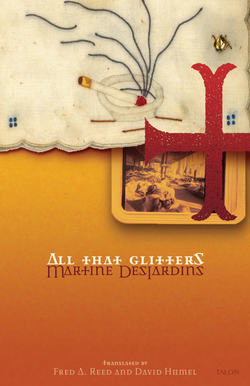Читать книгу All That Glitters - Martine Desjardins - Страница 10
На сайте Литреса книга снята с продажи.
ОглавлениеIV
OUR COMMANDING GENERALS finally concluded that the Canadian division was ready for action. One morning, King George V himself passed us in review, and Lord Kitchener, his Minister of War, took the opportunity to impart to us his recommendations. He instructed us to maintain friendly relations with those whom we were helping in the struggle, and that the honour of the British Army depended on our individual conduct. He warned us as well against the two great temptations that awaited us: wine and women. With women, in particular, we should avoid any intimacy that might adversely affect our health. Listening to him, you would have sworn that the lasses of Belgium and France were more dangerous than the Huns themselves.
His speech failed to impress me. As a member of the military police, whose red armband I now wore, I felt certain that women would be the least of my worries. My duties would consist of ferreting out spies, apprehending deserters and any fellow soldiers who failed to respect discipline; of directing troop movements and the evacuation of civilians. And, in the trenches, I would be called upon to fire upon the cowards who refused to go over the top.
I owed my assignment to the armed forces constabulary to the good offices of Lieutenant Peakes, who had personally recruited me. Broadly built and of above-average height, the lieutenant possessed what one might call an imposing bearing. With his imperial forehead, he stood a full head taller than anyone else. His knowledge of military history was as deep as it was broad, but for all that, his view of the Templars was ill-founded. In his view, they had been little more than armed bankers, and not at all true combatants. Conversely, he held the Roman legions in boundless esteem. He confessed to me that he had nearly been rejected for service because he had filled out his recruitment forms in Latin.
“Do you know why I chose you, Dulac?”
“Because I am such a poor shot that the infantry wanted nothing to do with me.”
“You are by no means a poor shot. When Cardinal Mazarin appointed a new general, he applied one single criterion by which he judged the man’s value: was he lucky or not? Well, it’s an open military secret that you possess a luck that is, let us say, uncommon.”
As for the advantages of my new assignment, I needed no convincing. A simple soldier must stand in rank and stay at his position. A military policeman, on the other hand, enjoys a certain freedom of movement and, though he might be stopped five miles distant from his battalion, he runs no risk of interrogation. His duty is to investigate all situations, follow all leads. What better cover for my own research than the hunt for looters and other war profiteers?
Lieutenant Peakes was not a likely competitor. Gold was of no interest to him. His family owned one of the country’s largest hardware store chains; he was drawn to iron the way filings are drawn to a magnet.
“Just think, Dulac, of everything a soldier carries on his back: his first-aid kit, his rifle, his bayonet, his knife, his cartridge belt and ammunition, his tent pegs, mess tin and utensils, not to mention his canteen, his lantern, his pick and shovel. Sixty-eight pounds of metal! Magnificent, when you think of it! The only problem is that iron attracts lightning. Have you ever been struck by lightning?
“No, lieutenant.”
“It happened to me, twice.”
The first time was fifteen years ago, he said. He was in the storage shed of his father’s hardware store when a clap of thunder sounded. At that very instant, a flash of blue lightning leaped from a box of nails onto his left hand. An electrical current shot up his arm and seized his heart. His skin turned grey, his muscles began to twitch, and he found himself on the ground, half-paralyzed, barely able to speak. For an hour, he lay looking at the floor tiles that had cracked beneath his feet. Then everything returned to normal. Until lightning struck for a second time. Since that time, he said, his entire organism had been in a constant state of upheaval. He felt a sense of oppression, unable to concentrate; he could no longer recognize himself.
“How did the second strike occur?”
“I met Miss Nell.”
“Your fiancée, lieutenant?”
“No, Dulac. One of the regimental nurses. That is the chink in my armour. I would throw myself out the window if she asked me. To my great mortification, she knows it.”
“She is that beautiful?”
“Beautiful? I couldn’t say. But she knows how to handle a needle. And those fingers of hers, Dulac … They are the fingers of a sorceress.”
